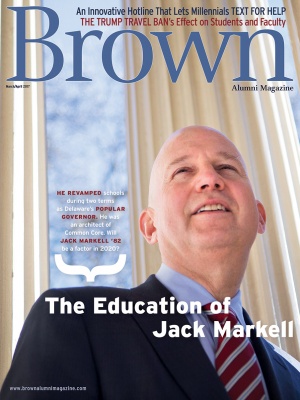One steamy morning in August last year, teachers gathered with principals, education officials, and a handful of politicians at Appoquinimink High School in bucolic Middletown, Delaware. Among them was the state’s governor, Jack Markell ’82, who had arrived eager to learn. Facing him were the first participants in Delaware’s pilot Teacher Leader program, one of many education-related initiatives Markell launched during his eight years in office, which ended this past January due to term limits.
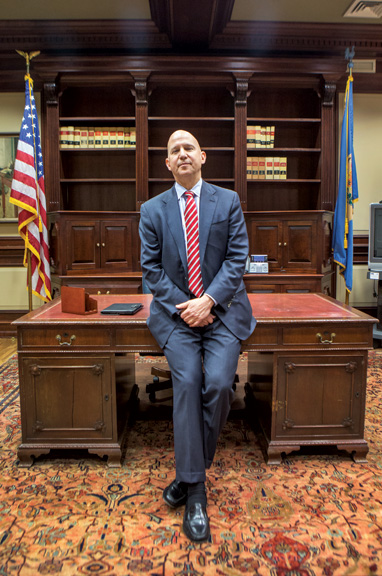
Teacher Leader aims to give teachers an opportunity to develop new educational approaches without having to forsake the classroom to become administrators. Through an application process, nineteen teachers were selected to focus on five areas: instructional practice, digital content, instructional strategies, community partnerships, and instructional culture. The teacher-leaders also coach their colleagues in implementing their ideas. The program ends in June.
The August gathering at Appoquinimink High School was the program kickoff, and Markell listened closely as the teachers, who represented elementary, middle, and high schools, presented their proposed goals. One teacher talked of raising her school’s math scores by 10 percent, another of improving attendance, and a third of creating instructional consistency as students moved from grade to grade. One teacher wanted 100 percent of students to feel that there’s an adult at the school who “knows and loves them.” The common thread was that each teacher-leader sought to address a specific problem and develop a solution that teachers in other schools could ultimately adopt. In this way, the initiative acknowledged the expertise of those who work in the trenches and empowered them to lead.
The enthusiasm of the assembled teachers was palpable that day, and, sitting casually tieless at one end of a long table, Markell offered encouragement and drilled them with questions. How would they organize their time? How would they handle colleagues who resist their suggestions? No detail was too trivial for Markell. “I think this is awesome,” he told the group. “I hope that all of you are really successful with this.”
Markell was friendly, approachable, and intensely focused. With just a few months left in his eight-year tenure, he seemed to be squeezing the most from every moment. “I love this job,” he exclaimed to a reporter after the meeting. “It’s an amazing job.” As his wife, Carla, would later say to the same reporter, “When he sees tangible results, that’s what gets him really excited.”
A fundamental idea behind Markell’s years as governor—and an idea that, to his great chagrin, has fallen out of favor nationally—is that the key to creating jobs in the United States is not turning inward behind walls but preparing workers to compete in a global, tech-driven economy. And doing that, Markell believes, requires serious educational reform.
Nationally, the most visible of these reforms has been the Common Core State Standards Initiative, which Markell pioneered. Although Common Core has wound up polarizing the politics of education, it began in 2009 with little controversy when a group of governors and state education officials, with strong backing from big employers, joined to develop voluntary standards designed to teach critical thinking skills and to measure state-to-state results using standardized tests. The underlying thinking was that American students needed better preparation for college and work, and that they should develop the tools they need to compete globally regardless of where they live.
Common Core isn’t a curriculum, but it does spell out skills that students should master at each level. In language arts, there’s a heavy emphasis on writing and citing evidence from readings. In math, students are asked not just to solve a problem but to diagram how they figured it out and to come up with alternate methods. The idea is not only to teach students how to follow rules but to help them understand why those rules work.
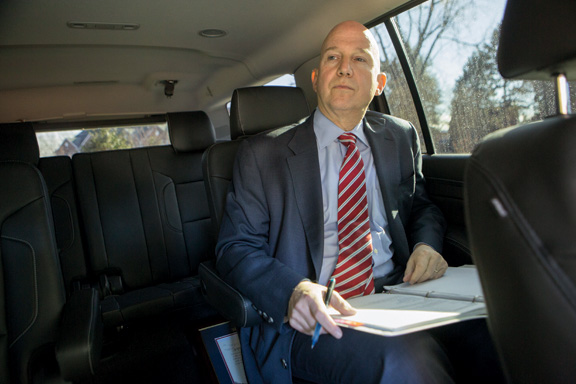
The whole thing began as a bipartisan initiative; Markell, a Democrat, was the group’s original cochair along with Republican Sonny Perdue, who was then governor of Georgia. More than forty states around the country joined the initiative. As Common Core rolled out, though, opposition bubbled up. Some teachers believed the standards weren’t always developmentally appropriate, while some parents cringed at unfamiliar teaching methods and a runaway testing culture in schools. Even as the U.S. Chamber of Commerce and other business groups held firm in their support, opposition mounted among conservatives leery of what they believed was federal government overreach, especially after the Obama administration linked funding through its Race to the Top initiative. That caused critics to charge that Common Core would lead to a top-down curriculum, and even to compare it to the Affordable Care Act (“ObamaCore,” some called it). Several nationally ambitious Republican politicians who’d once wholeheartedly backed Common Core—Louisiana governor Bobby Jindal ’92 among them—felt the backlash among their core backers and retreated.
“The feds are taking over and rushing this,” Jindal said when he announced his opposition. “Let’s face it: centralized planning didn’t work in Russia, it’s not working with our healthcare system, and it won’t work in education. Education is best left to local control.”
About half the states that had initially signed on pulled out of the two main multi-state testing consortia. Some states dialed back their involvement and others merely rebranded the program while leaving the standards mostly intact.
Markell shrugs off the criticisms. He points out that the Obama administration was “very clear” that Common Core was not a national initiative. In fact, he says, part of the impetus for Common Core was a fiscally prudent desire to pool the cost of hiring experts and developing tests. His Republican peers, he said, actually embraced the program at first, “because they thought it would keep the federal government out of it.” Nor does he buy the argument that standards should be tailored to specific state populations. “Algebra’s not state-specific,” he argues. In any event, he notes, states that have gotten rid of Common Core now have standards that “look a lot like Common Core.”
Arne Duncan, the U.S. Secretary of Education during much of President Obama’s presidency and a Markell admirer, agrees with that assessment. “I defy anyone to say why having low standards benefits kids,” he says. “The fact that we had to fight that is a sad commentary. The fact of the matter is that forty-plus states raised their standards. That was a battle that [Markell] helped lead.”
Markell is quick to pivot away from the perception that Common Core is his signature education achievement. He says he’s prouder of four other initiatives in Delaware that played out on his watch: greatly expanded funding for early childhood education, a statewide language immersion program that has 3,000 students on track to learn Mandarin or Spanish by the fourth grade, a program to remove barriers preventing low-income students from attending college, and a workforce training program that allows high school students to earn college credit by working in professional settings. He also notes that, under his administration, graduation rates in Delaware reached a record high, and the state saw a 237 percent increase since 2013 in high school students enrolling in college courses.
He defended his approach in an essay titled “America Needs Jobs, Not Populism,” which was published in the May 2015 issue of The Atlantic. The essay elucidated his rationale for the importance of a strong education policy and identified the dangers behind the emotionally satisfying simplicities that were gaining traction in presidential politics at the time, on both the left and the right. Markell argued that railing against fat-cat salaries and a “rigged system,” as crowd-pleasing as that may be, is an exercise in futility. Instead he urged a shift in focus to what he called “the real problem.”
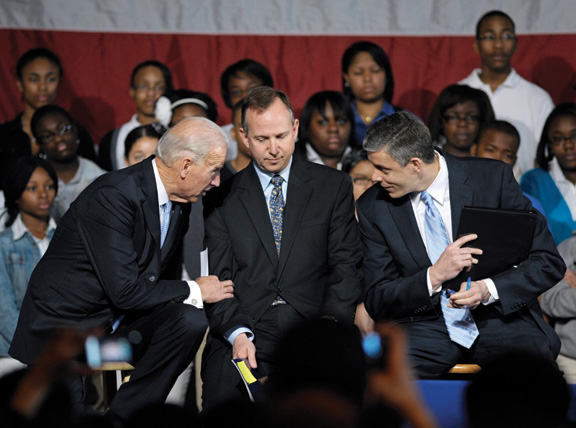
“The economic system,” he wrote, “isn’t so much fundamentally rigged, as the populists contend, as it is fundamentally, unalterably, never-to-be-the-same-again changed. And long before the financial crisis hit, Americans shrugged off this changing world.” He insists that economic growth and social justice are not only compatible but synergistic.
“So much wealth will be created around the world. I think it’s important that Americans participate,” he wrote. “We live in a world where wage stagnation is a huge issue. I still do believe that how we fix it is in investing in skills” and “making sure that markets around the world grow.… Because of the global economy, employers have more choices than they’ve ever had before of where to hire people, and because of automation they have fewer employees. In that world, having people with the right skills is more important than it’s ever been.”
Arne Duncan says he was immediately impressed by Markell’s passion and knowledge from the day they met, back when Markell was a new governor and Duncan was a new education secretary addressing the nation’s governors in 2009.
“He was so thoughtful, so strategic, he asked such good questions,” Duncan says. “I thought, ‘This guy’s different. He’s special.’ He just had a level of thoughtfulness that not everyone had.”
The two quickly became friends. “The amount of time he spent on these issues, relative to other governors, is extraordinary,” Duncan says. “He was very, very smart politically, but he was willing to pay a political price to do the right thing for kids. That takes real courage. He would do things that he was smart enough to know would cost him, but he did them anyway.”
Jack Markell grew up middle class in Newark, Delaware, the son of a University of Delaware accounting professor and a social worker for the state department of health and social services. He attended Newark High School, and started dating his future wife, whom he’d known since kindergarten, when they worked at a local Friendly’s together. His horizons expanded greatly when his father took the family with him on a sabbatical in Britain and New Zealand during his senior year in high school. The family also visited India, a country that affected the young Markell profoundly. Shocked by the poverty he saw after he got off the bus in New Delhi, he says he asked family friends about conditions there and learned about the caste system and the country’s profound lack of decent jobs.
Markell was drawn to Brown after visiting on a beautiful day and watching students throw Frisbees on the College Green. He found the New Curriculum appealing. But his brief time in India also provided him with an academic purpose. He concentrated in development studies and economics, with an eye toward pursuing a career in economic development. His classes centered mostly on Latin America, with some African and Asian studies thrown in. He played on the table tennis club team and got a taste of politics when he lost a race for class president. (His son, Michael, is now a junior at Brown, and his daughter, Molly, is a graduate of Penn.)
During his senior year, Markell considered joining the Peace Corps but instead enrolled in a combined MBA/bank training program at the University of Chicago; he thought it would give him the expertise to figure out how to attack big problems. The folks who controlled the money, he figured, were the ones who made the decisions. “He was just the most straightforward, no bullshit, what-you-see-is-what-you-get guy,” Tony Weisman ’82, his roommate at the time, recalls. (Weisman now runs a Chicago ad agency.) “He had the most affectionate, endearing laugh of anyone on earth. He just puts people at ease. Jack is also crazy smart, and because he’s crazy smart, he has the capacity to be very persuasive.”
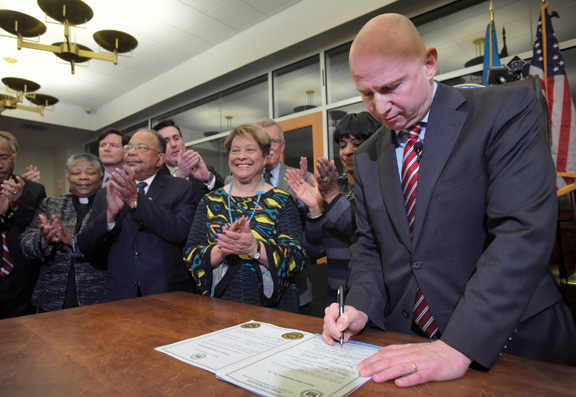
MAKING AMENDS Flanked by state legislators on February 10 last year, Markell signs the Delaware House resolution apologizing for the state’s role in supporting slavery. He also presented a proclamation recognizing February as African American History Month.
While in business school, Markell made a point of studying the work of the legendary community organizer Saul Alinsky, author of Rules for Radicals: A Pragmatic Primer for Realistic Radicals. The worlds of realistic radicals and ambitious MBAs don’t often overlap, Markell admits, “but they should.”
“I know it wasn’t all mapped out from the beginning,” Weisman says of his former roommate’s career, but “I think everything was about ‘How do I make the most impact to affect the most people’s lives?’ He was never going to become a banker for life. It was ‘This is going to give me the resources, the knowledge, the connections to achieve a life helping others.’”
After Chicago, the future governor put in stints at Comcast, McKinsey, and First Chicago. He was the thirteenth employee at the company that would eventually become the telecom giant Nextel and actually coined the company’s name. But Markell wanted to get back to Delaware and longed to work in his state’s public sector. After moving back, he ran against an incumbent Republican for state treasurer in 1998 and won. He brought his business experience to the job and launched initiatives to improve financial literacy and encourage eligible families to apply for the Earned Income Tax Credit.
Ten years later, with then-Governor Ruth Ann Minner facing term limits, Markell bucked Democratic Party expectations and mounted a maverick primary campaign against the man who had widespread establishment support and was considered next in line, then–Lieutenant Governor John Carney. Samuel Hoff, a political scientist at Delaware State University who closely follows state politics, said Markell’s business background appealed to voters, as did some innovative revenue ideas. His campaign also raised a Delaware record of $4 million, including $725,000 from his own pocket.
Markell became governor in 2009 amid the national economic collapse. Delaware’s famous financial sector shed jobs, both Chrysler and GM closed local plants, and a major refinery shut down. The state faced an $800 million shortfall, and Markell was forced to eliminate more than 1,000 state jobs, cut worker pay, and take other drastic measures to stanch the bleeding. All the while, he was still getting his bearings and figuring out how to deal with uncooperative legislators.
Unemployment soared during Markell’s early years, but statistics from the governor’s office show the state has added more than 60,000 jobs since 2010. Aside from money matters, Hoff says Markell also left a socially progressive legacy. He played a major role in getting Delaware to stop employing the death penalty—although it remains legal—and supported same-sex marriage. He raised the state’s minimum wage and supported programs to address addiction, such as a needle exchange program. His wife, Carla, who has faced addiction in her family, became an outspoken advocate for treatment. Hoff also gives Markell credit for pushing a six-year drive to get Delaware to formally apologize for its history of slavery. Markell “got out in front of that issue at a time when it wasn’t that popular,” Hoff says, and signed the apology to much fanfare last year. All in all, Hoff says, Markell left the state better than it was when he became governor.
Markell also had a national profile during his eight years as governor. He chaired the Democratic Governors Association and the National Governors Association and after last year’s presidential election traveled once more to India in his role as president of the National Council of State Governments. He serves as honorary cochair of the NewDEAL, a national network of “pro-growth progressives,” along with Virginia Senator (and Nextel cofounder) Mark Warner.
He also wrote opinion pieces on a wide range of issues. In the Washington Post he took on Wisconsin Governor Scott Walker’s cuts in education funding, arguing that the approach was exactly the wrong way to fuel economic growth. In the New York Times he advocated policies that improve access to birth control and linked the goal of avoiding unplanned pregnancies to economic prosperity. After the fall elections, he published a letter to the editor in the Times urging President-elect Donald Trump not to deport undocumented college students, or Dreamers.
In his final year in office, a set of state surveys across the nation by the polling firm Morning Consult showed Markell’s approval rating in Delaware at 66 percent, making him the fourth most popular governor in the country and the first among Democrats.
All this success has made Markell a Democrat to watch. He says he wouldn’t rule out a future run for office but adds that “it’s not at the top of my list.” People who know him speculate that he could well end up at some sort of think tank or policy shop, perhaps one that focuses on education. Carla Markell predicts he’ll land in some “job where he feels like he’s making a difference, because it’s so much a part of his fiber.” Duncan says Markell will have plenty of options. As for whether that would involve education, he says, “I hope so.”
Hoff says he wouldn’t be shocked to see him run for some future office, perhaps in the Senate, but he expects Markell to be involved in the big issues of the day in some way.
“To me he’s a policy guy,” Hoff says, “and he’s also a guy that likes to see results.”
Contributing Editor Stephanie Grace is a political columnist for the New Orleans Advocate.

